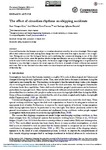The Effect of Circadian Rhythms on Shipping Accidents

Ver/
Use este enlace para citar
http://hdl.handle.net/2183/28062
A non ser que se indique outra cousa, a licenza do ítem descríbese como Atribución 4.0 Internacional (CC BY)
Coleccións
Metadatos
Mostrar o rexistro completo do ítemTítulo
The Effect of Circadian Rhythms on Shipping AccidentsData
2021Cita bibliográfica
Vinagre-Ríos, J., Pérez-Canosa, J., & Iglesias-Baniela, S. (2021). The effect of circadian rhythms on shipping accidents. Journal of Navigation, 1-11. doi:10.1017/S0373463321000333
Referencia a
https://www.cambridge.org/core/journals/journal-of-navigation/article/effect-of-circadian-rhythms-on-shipping-accidents-corrigendum/2C99DFEF13B5EDF386589C5582985F9B
Resumo
[Abstract] It is a well-known fact that humans are subject to circadian alterations caused by the action of sunlight. This strongly affects their behaviour and skill, making them change their level of alertness from high at daytime to low at night-time. Taking into account this biological feature, and considering that commercial shipping is one of the oldest round-the-clock activities, raises the question whether bridge watchkeepers can carry out their tasks on night shifts with the same level of alertness as on day shifts. Furthermore, night bridge watchkeeping has to be performed in darkness or very dim light to improve the visual capacity of lookouts. A sample of vessel collisions was analysed and it was find out that this kind of accident tends to be more frequent and more serious during the darkness period of the solar day.
Palabras chave
Safety
Human error
Bridge
Human error
Bridge
Descrición
Financiado para publicación en acceso abierto: Universidade da Coruña/CISUG
Versión do editor
Dereitos
Atribución 4.0 Internacional (CC BY)
ISSN
1469-7785






